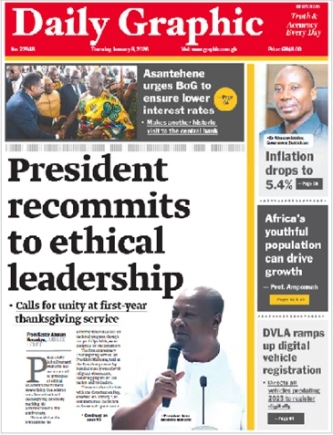
Moves to share properties between EP, Global Evangelical; Generates controversy
A group in the Evangelical Presbyterian (EP) Church, Ghana calling itself Defenders of the Faith is kicking against reconciliation overtures between the church and the Global Evangelical Church (GEC), the church that broke away from the EP Church in the 1980s over constitutional and doctrinal differences.
According to the group, the reconciliation committee established by the EP Church was a fluke, adding that similarly, a committee that was in charge of sharing properties of the EP Church between EP and the GEC had no locus.
It, therefore, called on three pastors of the EP Church — Rev. L.J.K Dzakpasu, Rev. C.G.K. Fayose and Rev. E.A.K. Amey, who are part of the committee, “to immediately step down from their positions, since they don’t have the church’s interest at heart and have no mandate to share the church’s properties”.
In a 13-point resolution made available to the Daily Graphic, the group called on the leadership of the church to immediately cease what it described as flirtation with the GEC.
Claims can derail peace process -- EP Church
But the Moderator of the EP Church, the Rt Rev. Seth Agidi, told the Daily Graphic that the claims would only inflame passions among members of the two churches and stall the peace, unity and reconciliation efforts.
“We are partners in peace building and must do all we as Christians can to discourage strife,” he added.
He stated that the church’s decision to establish a reconciliation committee was not taken by an individual but rather the General Assembly to ensure peaceful co-existence between the two churches.
“These claims will derail the peace process. We are very concerned about that. There are people who are in one family but attend the two churches. In some instances, the husband is in the EP Church while the wife is in the GEC. It is the responsibility of the church to ensure that they live peacefully,” he said.
The group had some questions: “Is the legal board of the church involved in the sharing of the properties? Were the affected congregations involved in the sharing of the properties?”
But the moderator said the church had not withdrawn any of the cases from court to allow the parties to reach a mutually beneficial decision.
All we want is peace -- GEC
The Moderator of the GEC, the Rt Rev Edem Tettey, shared similar sentiments when he said: “We are trying hard to see how we can peacefully co-exist. For us, we shouldn’t be fighting each other but live peacefully as brothers and sisters.
“So far as we are concerned, we want peace. If there is any problem, we want to sit down and talk about it and not resort to the courts.”
Background to split of the EP Church
The EP Church split in the early 1980s over constitutional disagreements on the terms of office of the moderator and doctrinal differences.
The Right Rev. Prof. Noah Komla Dzobo, the leader at the centre of the controversy, was elected Moderator of the church in 1981 and he took over as the eighth indigenous Moderator of the EP Church.
In 1983, he caused to be printed and circulated within the church a constitution allegedly said to have been written at the joint synod of the church held at Betannia, Lome in Togo, from February 14–18, 1980.
That constitution contained a controversial provision in Article 31 which stipulated that a moderator or synod clerk could be elected as many times as possible to office, provided he was capable.
That provision conflicted with the 1975 (also known as 1979) constitution. The “insertion” raised a lot of protest from a broad section of church members, from laity to clergy.
On Friday June 24, 1988, about 10 people representing a group which was called “Concerned Members” of the EP Church met the Rt Rev. Prof. Dzobo to discuss some disturbing issues, including constitutional matters, with him.
Their discussions ended in a stalemate, and when the Rt Rev. Prof. Dzobo managed to get the synod of 1988 to endorse his controversial third term in office, the concerned members decided to seek redress at the courts.
The Ho High Court ruled initially to nullify the endorsement of the Rt Rev. Prof. Dzobo as Moderator for a third term but he promptly appealed against the ruling and had the execution of the ruling stayed.
After some lapse of time, the Court of Appeal in Accra decided on the matter. The ruling of the Appeal Court could be summed as follows: The EP Church has been without a valid constitution since 1978.
That ruling implied that the Rt Rev. Prof. Dzobo's election since 1980 had been unconstitutional and done in error.
The ruling in effect had set the stage for each faction to decide the next line of action. It was, indeed, the spark that legalised the split in the Church.
Subsequently, the EP Church was split into EP Church Ghana and EP Church of Ghana, which later became the GEC on the orders of an Accra High Court.
After many years of fighting in the courts and sometimes physically, calm returned and the two churches co-existed peacefully, with the leadership attending each other’s synod.

 Click the link to read your copy.
Click the link to read your copy.